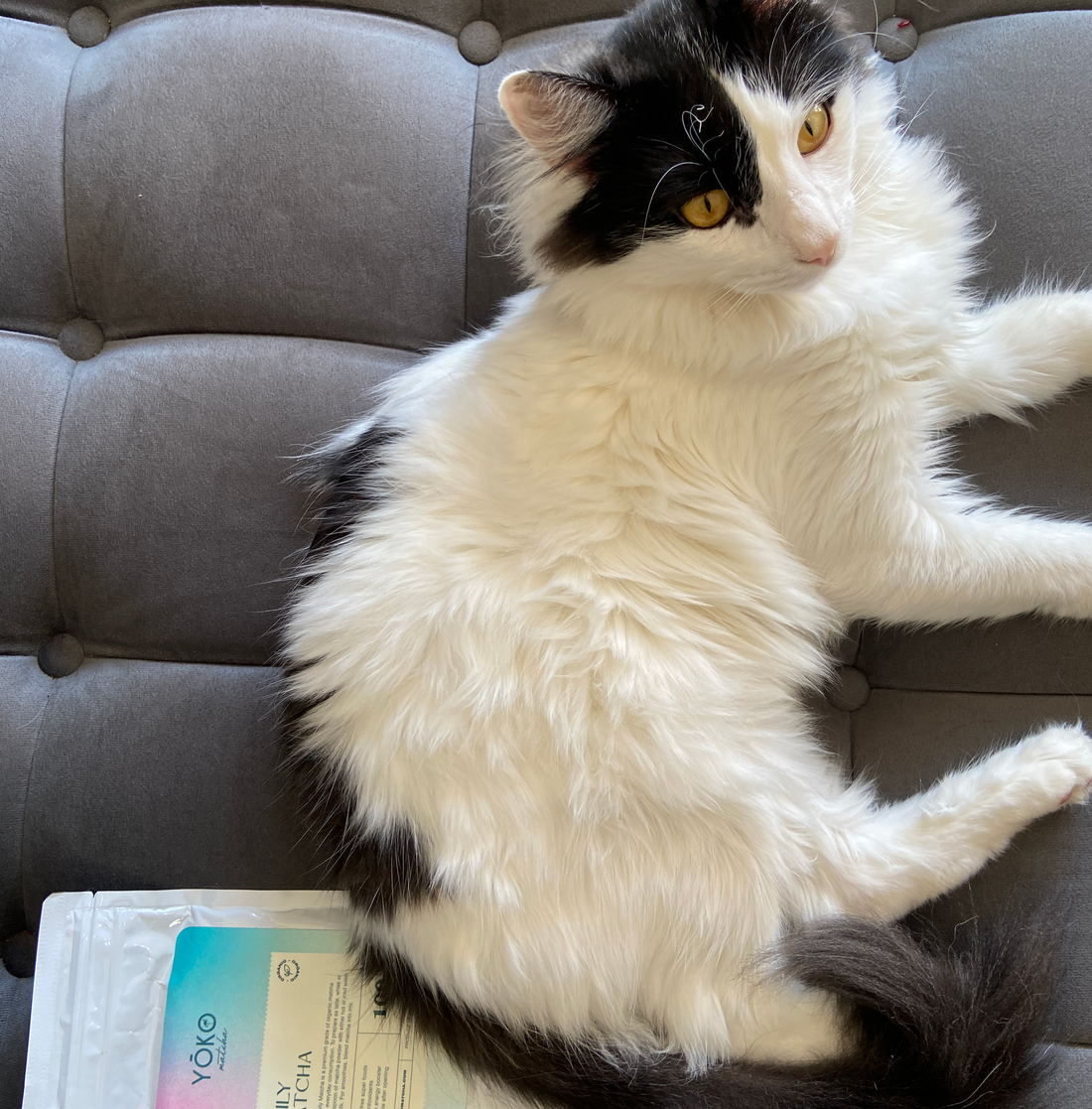In recent years, matcha, a powdered green tea renowned for its health benefits in humans, has garnered attention as a potential supplement for pets.
As pet owners increasingly seek natural remedies and nutritional enhancements for their furry companions, the question arises: Is matcha safe and beneficial for pets, or does it pose potential risks?
Introduction
Originating from Japan, matcha is made from finely ground green tea leaves, containing high levels of antioxidants, vitamins, and amino acids.
Its properties are believed to promote alertness, boost metabolism, and support overall well-being in humans. However, when it comes to our pets – be it dogs, cats, or other domestic animals – the effects might differ.

The Pros: Potential Benefits for Pets
Antioxidant Properties
Just as in humans, the antioxidants present in organic matcha may offer potential health benefits for pets. Antioxidants help combat free radicals that can cause cellular damage, potentially supporting the immune system and overall health in animals.
Nutritional Value
Matcha contains vitamins such as vitamin C, E, and trace minerals like zinc and magnesium. When provided in moderation and as part of a balanced diet, these nutrients might contribute positively to a pet's overall health.
Potential Calming Effects
Some pet owners suggest that the presence of L-theanine, an amino acid found in matcha, might help in calming anxious pets. However, conclusive scientific evidence in this regard is limited.

The Cons: Risks and Considerations
Caffeine Content
One of the primary concerns with matcha consumption for pets is its caffeine content. While matcha has lower caffeine levels compared to coffee, it still contains a considerable amount.
Pets are often more sensitive to caffeine, and excessive intake can lead to adverse effects such as restlessness, increased heart rate, vomiting, and even seizures.
Digestive Sensitivity
Introducing new foods or substances into a pet's diet can upset their stomach or cause digestive issues. Matcha Green Tea might have a similar effect due to its unique composition, potentially leading to gastrointestinal discomfort or diarrhea.
Lack of Scientific Evidence
Despite anecdotal claims and some preliminary studies, there's a scarcity of concrete scientific evidence supporting the beneficial effects of matcha specifically for pets. The impact, dosage, and potential long-term effects on animals remain largely unstudied.

Safety Measures and Recommendations
Consultation with a Veterinarian
Before introducing matcha or any new supplement into a pet's diet, it's crucial to seek guidance from a qualified veterinarian. They can provide tailored advice based on the pet's health, age, breed, and potential underlying conditions.
Moderation is Key
If a veterinarian approves the incorporation of matcha, it should be given in moderation. Carefully monitored quantities can help mitigate potential risks while possibly providing some health benefits.
Observation and Responsiveness
After introducing matcha, closely observe your pet for any signs of discomfort or adverse reactions. If there are any concerning symptoms, immediately discontinue its use and consult a veterinarian.
Conclusion: The Verdict on Matcha for Pets
In the ongoing quest for alternative and natural health remedies for pets, matcha stands as a potential supplement with both advantages and risks.
While it may offer antioxidant benefits and certain nutrients, its caffeine content and potential digestive sensitivity in animals warrant caution.
Ultimately, the decision to offer matcha to pets should be made with careful consideration, consultation with a professional, and close monitoring of their well-being.
As research in this area continues, pet owners must prioritize their pet's safety and well-being above all else.
By weighing the potential benefits against the risks, pet owners can make informed choices regarding whether matcha aligns with their pet's individual health needs.
As always, a veterinarian's guidance remains invaluable in ensuring the best care for our beloved animal companions.
FAQs
1. Can I give matcha to my pet?
Matcha can potentially be given to pets, but it's essential to consult a veterinarian before doing so. Their guidance can help determine if matcha is suitable for your specific pet based on factors like health condition, age, and breed.
2. What are the potential benefits of matcha for pets?
Matcha contains antioxidants and nutrients that might offer health benefits to pets, such as supporting the immune system and providing vitamins and minerals. Some suggest it may have calming effects due to the presence of L-theanine.
3. Are there any risks associated with giving matcha to pets?
Yes, there are risks. Matcha contains caffeine, which can be harmful to pets in excessive amounts, causing restlessness, increased heart rate, vomiting, and even seizures. Additionally, introducing new substances into a pet's diet might lead to digestive issues.
4. How much matcha is safe for pets?
The appropriate dosage of matcha for pets varies depending on factors like size, health condition, and individual sensitivity.
It's crucial to follow a veterinarian's recommendation regarding the quantity and frequency of matcha intake for your pet.
5. Can matcha help calm anxious pets?
Some pet owners believe that L-theanine in matcha might have calming effects on anxious pets. However, scientific evidence confirming this effect in animals is limited.
6. How should I introduce matcha to my pet's diet?
If approved by a veterinarian, introduce matcha gradually and in small amounts. Monitor your pet for any adverse reactions and discontinue use if any negative symptoms occur.
7. Are there alternative supplements to matcha that are safer for pets?
There are various pet-specific supplements available that are formulated to meet specific nutritional needs.
It's advisable to explore these options, consulting a veterinarian to find the most suitable supplement for your pet.
8. What should I do if my pet shows adverse reactions after consuming matcha?
If your pet displays any signs of discomfort, adverse reactions, or unusual behavior after consuming matcha, stop its intake immediately and seek veterinary care. Observing and responding promptly to such symptoms is crucial.
9. Can matcha be given to all types of pets?
Matcha should be considered carefully and might not be suitable for all types of pets. Always consult with a veterinarian before giving matcha to any animal, ensuring it's safe and appropriate for your pet's species and health condition.
10. Is there scientific research supporting the use of matcha for pets?
While there's some anecdotal evidence and preliminary studies, there's a lack of extensive scientific research on the effects of matcha specifically on pets. Pet owners should rely on professional veterinary advice when considering matcha for their pets' diets.




